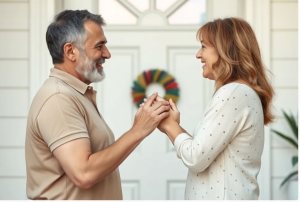I recently attended a panel discussion on the topic of happiness. Early on in the dialogue, one of the panelists addressed what he considered the mistaken way that most people think about happiness, namely, as a state that is free from pain or difficulty. He explained that we need to view happiness as a state in which all feelings are present and welcome, not just positive emotions. He went on to say that it is important to be able to sit with our feelings and feel what is actually happening inside us, even if it is hard stuff. While not new or revelatory, this is a profoundly true and important teaching, and one that I have also spent a lot of time writing about. What was revelatory however, was the follow-up question from the American journalist/moderator.
Upon hearing his suggestion that we “sit” with our real feelings, the journalist immediately jumped in to ask the following: How realistic was it for most people to be able to “just sit around” and feel their feelings? Was this not an issue of class in that the higher socioeconomic classes could spend their time contemplating their sadness while the rest of us regular folks had to get to work? How possible was it, really, for the average person, to be with or in their sadness, “sitting still” when things needed to get done? After all, didn’t we all need to get out the door and earn a living?
The word “sit” had lit this moderator on fire, and in her response, morphed into “sitting still” and “just sitting around.” She was, seemingly, quite angered by the audacity of this author to suggest that we could feel our sad feelings in addition to our happy ones. As strange as it was to hear where the moderator went with his suggestion, her reaction is in fact common. In this culture we are afraid of feelings that are not happy, and conditioned to believe that feeling anything other than pleasure will prevent us from being able to go to work, live a normal life, or take care of ourselves. Allowing difficult feelings to be present will not only prevent us from basic functioning but will also endanger any positive feelings that might exist. Happiness is an all or nothing condition. The underlying belief is that feeling our feelings as they really are will lead us to be fixated on our navel (the much maligned body-part associated with sad feelings), crying and eating chips on a dirty couch. A real life, one that includes going to work, buying groceries and being normal, and a state in which we feel our real feelings are two entirely separate things—and cannot coexist. We hold the subtle (and sometimes not so subtle) belief that anyone who has the luxury of feeling their feelings must be independently wealthy and able to devote their entire life to their own struggles. And, if we are not already self-indulgent, self-absorbed, and unemployed, the privilege to experience painful feelings will lead us to become this way.
This journalist’s line of questioning clearly exposed the degree of fear and helplessness that we experience when in the face of challenging emotions. Given that difficult feelings are a part of everyone’s life, it has always amazed me that courses on learning how to be with and soothe such feelings is not required curriculum in every formal education. It is a real life skill that everyone needs. The idea that we could actually feel difficult feelings and still be strong and content is not only not taught, but instead we are encouraged to believe the opposite, that if we do allow ourselves to feel what’s inside us, our dark feelings will overwhelm and swallow us, never go away, and take us out of commission for life. And so we spend enormous amounts of energy trying to stay away from the harder feelings, fending them off, papering them over, keeping ourselves from feeling anything that we believe could disable us.
In truth, feeling our true feelings is not contradictory to living a functioning life. Quite the opposite. The more we allow our true experience to be felt, the more energy and attention we have to devote to our functioning life. We are no longer using up our energy and focus trying to push away the feelings that we don’t want and are afraid to feel. In addition, when we actually feel a feeling, we discover that no matter how strong or hard the feeling is, it has a natural life span and can only remain with intensity for a short time, far shorter than we have been led to believe. Feelings, when felt, actually pass through awareness and then ease, on their own. They may return but they will pass again, in contrast with the thoughts that we generate about the negative feelings, which continue unceasingly. Furthermore, feeling our feelings takes no effort, other than the slight effort that it is to give ourselves permission to feel them. And yet, even with no effort expended, the simple act of allowing what we feel, what is already there to be felt, has a profoundly satisfying and relaxing effect. When we stop having to fend off what we are not supposed to or allowed to feel, running from our truth, we can then relax into the embrace of our own company, and settle into our own real life.
The belief that we stay strong by ignoring our difficult emotions is false. Thinking that we must ignore how we really feel in order to make a living, be productive, get off the couch, or just plain take care of ourselves, leaves us in a state of constant fear. Every life contains happy feelings and sad ones too; such is the human condition. If we are afraid of our sadness and don’t believe we can manage or live a life with it, then our life contains a constant presence that is a threat to our basic wellbeing. As a result, we are in a state of perpetual weakness.
We are at our strongest, most high functioning and confident when we have the ability to experience whatever is passing through our feeling sky, without having to run from it, pretend it’s not there or force it away. We are most warrior-like when we learn to co-habitate with the full range of feelings, contradictory as they often are. We find our deepest confidence when we know (from lived experience) that feelings come and go and we can survive them, and will become a little bit stronger with each passage. We discover our most profound caretaker, inside ourselves, when we stop defending a single-pointed happiness, which always excludes another part of our story. We are at our most content and healthy when we give ourselves the blessing that it is to relax into what we actually feel, and live in our truth. Allowing ourselves to sit with our feelings, the ones we like and the ones we don’t, does not only not conflict with taking care of ourselves and conducting a real life—it is, in truth, our best means for taking care of ourselves and the very essence of a real life.



One Response
We all have feelings. All emotions, pleasant and unpleasant ones, are a natural part of us, humans. We eat, we breathe, we feel emotions. They are a way of engaging with the world. It will never fail to surprise me how little knowledge and understanding there is in the world around what emotions are and what their purpose in our lives is… But unfortunately the approach this journalist showed is not an exception.
I couldn’t agree more that “Allowing ourselves to sit with our feelings, the ones we like and the ones we don’t, does not only not conflict with taking care of ourselves and conducting a real life—it is, in truth, our best means for taking care of ourselves and the very essence of a real life.” I just hope that more and more people will be able to discover the purpose of emotions and find a way to build a healthy relationship with them.
Thanks for the article! Very inspiring!